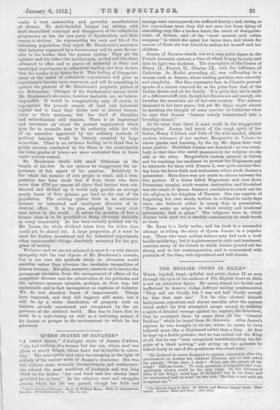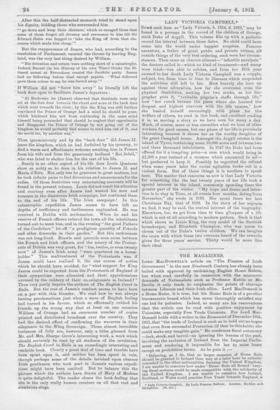THE ENGLISH COURT IN EXILE.*
WEAK, bigoted, inept, spiteful, and petty, James II. as seen through the eyes of the authors of The English Court in Eiile
is not an attractive figure. He seems almost too foolish and ineffectual to deserve Judge Jeffreys' wailing condemnation " They call me bloody, but I was not half bloody enough for him that sent me." Yet he who . showed himself lachrymose, repentant, and almost maudlin after the capture which ended his first attempted escape nursed so undying a spirit of detailed revenge against his captors, the fishermen,
that he exempted them by name from all the " General Pardons" which be issued from St. Germain. After James's capture, he was brought to an inn, where be seems to have behaved more like a frightened rabbit than a king. At first he kept up a feeble pretence that he was indeed not the King at all, but he was " soon recognized notwithstanding his dis- guise of a black periwig," and giving up the pretence he talked freely to one of the gentlemen who stood hear.
"Ito declared he never designed to oppress eonseionce, alter the government, or destroy the subjects' liberties, and at last asked
me What have I done P What are the errors of my reign P Tell me freely.' To such questions a respectful and com- passionate silence could be the only reply. In the disordered state of the King's mind tags of Scripture ran in his head, and he 'Bernionized half an hour' on the text, He that is not with me is against me.' "
• The EngliA, Court in Exile,' By Edwin and Marian Sharpe .Grow, traced. London Mills and Boon. 1.15s. not.]
After this the half-distracted monarch tried to stand upon his dignity, bidding those who surrounded him
"' go down and keep their distance,' which so enraged them that some of them forgot all decency and reverence to him .till Sir Edward Hales was begged to ' take the King off from that dis- course which made him cheap.'"
But the reappearance of James, who bad, according to the resolution of Parliament, vacated the throne by leaving Eng- land, was the very last thing desired by William.
"His detention and return were nothing short of a catastrophe. Indeed, Burnet (in his History of his own Time) thinks the ill- timed arrest at Feversham created the Jacobite party. James had no following before that except papists. ' What followed gave thorn colour to say he was forced away."
If William did not "force him away" he literally left the back door open to facilitate James's departure :
"At Rochester he (James) observed that Sentinels were only set at the fore door towards the street and none at the back door which went towards the river ; by this the King was still further convinced the Prince of Orange had a mind he should be gone, which hindered him not from continuing in the same mind himself being persuaded that should ho neglect that opportunity and disappoint the Prince of Orange by not going out of the kingdom he would probably find means to send him out of it, and the world too, by another way."
• Thus ignominiously and by the "back door" did James II. .leave the kingdom, which he had forfeited by his tyranny, to , find a warm and affectionate welcome awaiting him in France from his wife and from the generously inclined " Roi Soleil," who was fated to shelter him for the rest of his life.
. Surely in no other aspect of his life does Louis Quatorze
• show as nobly as he does in his relation to James II. and .Maria d'Este. Not only was he generous in great matters, but he took infinite pains to find diversions and amusements for the exiles. Of these festivities very entertaining accounts will be found in the present volume. Louis did not remit his attention and courtesy even after James had wasted his men and treasure in the disastrous Irish campaign, but continued them to the end of his life. The Irish campaign ! In this catastrophic expedition James seems to have left no depths of inefficiency and tactlessness unplumbed. He was received in Dublin with acclamation. When he and his reserve of French officers entered the town all the inhabitants turned out to meet him, and in the evening " the good Fathers of the Cordeliers " let off "a prodigious quantity of Petards And other fireworks in their garden." But this enthusiasm .was not long-lived. Brawls and quarrels soon arose between the French and Irish officers, and the misery of the Protest- ants of Dublin was very great, for "ten, twelve, or even twenty men" of James's Irish army " were quartered on a house- bolder." This maltreatment of the Protestants was, if James could have realized it, the one course of action which be should have avoided, for " what support for King James could be expected from the Protestants of England if their sympathies were alienated and their apprehensions aroused by the robbery of their co-religionists in Ireland ? " Thus very justly inquire the authors of The English Court in Exile. But the rest of James's conduct seems to have been on a par with this blunder. We read how he was always issuing proclamations just when a wave of English feeling had turned in his favour, which so effectually rubbed his friends up the wrong way that at least on one occasion William of Orange had an enormous number of copies printed and distributed broadcast over the country. They had the desired effect of confirming the waverers in their allegiance to the Whig Sovereign. These almost incredible instances of folly are, however, only a tithe gleaned from Mr. and Mrs. Sharpe Grew's interesting work, a work which should certainly be read by all students of the revolution. The English Court in Exile is an exceedingly interesting and readable book. Clearly a great deal of time and trouble have been spent upon it, and neither has been spent in vain, though perhaps some of the details lavished upon obscure Irish gentlemen who took part in James's various expedi- tions might have been omitted. But to balance this the picture which the authors have drawn of Mary of Modena is quite delightful. The reader closes the book feeling that she is the only really human creature on all that vast and cumbrous stage.



















































 Previous page
Previous page